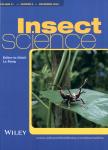Zebra chip disease incidence on potato is influenced by timing of potato psyllid infestation, but not by the host plants on which they were reared
Zebra chip disease incidence on potato is influenced by timing of potato psyllid infestation, but not by the host plants on which they were reared作者机构:Texas AgriLife Research Texas A&M University System 2415 E. Highway 83 Weslaco TX 78596 USA
出 版 物:《Insect Science》 (昆虫科学(英文版))
年 卷 期:2009年第16卷第5期
页 面:399-408页
核心收录:
学科分类:09[农学] 0904[农学-植物保护] 0901[农学-作物学] 090402[农学-农业昆虫与害虫防治]
主 题:Bactericerca cockerelli glucose reducing sugars starch sucrose zebra chip disease
摘 要:The Zebra chip (ZC) syndrome is an emerging disease of potato and a major threat to the potato industry. The potato psyllid, Bactericerca cockerelli (Sulc) is believed to be a vector of the ZC pathogen, which is now thought to be Candidatus Liberibacter, a bacterium. To further understand the relationship between potato psyllid infestation and ZC disease expression, healthy potato plants at different growth stages (4, 6 and 10 weeks after germination) were exposed separately to potato psyllids that were separately reared on four solanaceous hosts plants (potato, tomato, eggplant or bell pepper) for more than 1 year. ZC symptoms, leaf rates and total nonstructural carbohydrate accumulation in leaves and tubers of healthy and psyllid-infested plants were monitored and recorded. Typical ZC symptoms were observed in leaves and tubers of all plants exposed to potato psyllids regardless of the host plant on which they were reared. This was also accompanied by significant reductions in net photosynthetic rate. Caged potato plants without exposure to potato psyllids (uninfested controls) did not show any ZC symptom in both foliage and in harvested tubers. Foliage damage and ZC expression were most severe in the potato plants that were exposed to potato psyllids 4 weeks after germination compared to plants infested at later growth stages. Tubers from potato psyllid-infested plants had significantly higher levels of reducing sugars (glucose) and lower levels of starch than those in healthy plants, indicating that potato psyllid infestation interfered with carbohydrate metabolism in either leaves or tubers, resulting in ZC expression.



